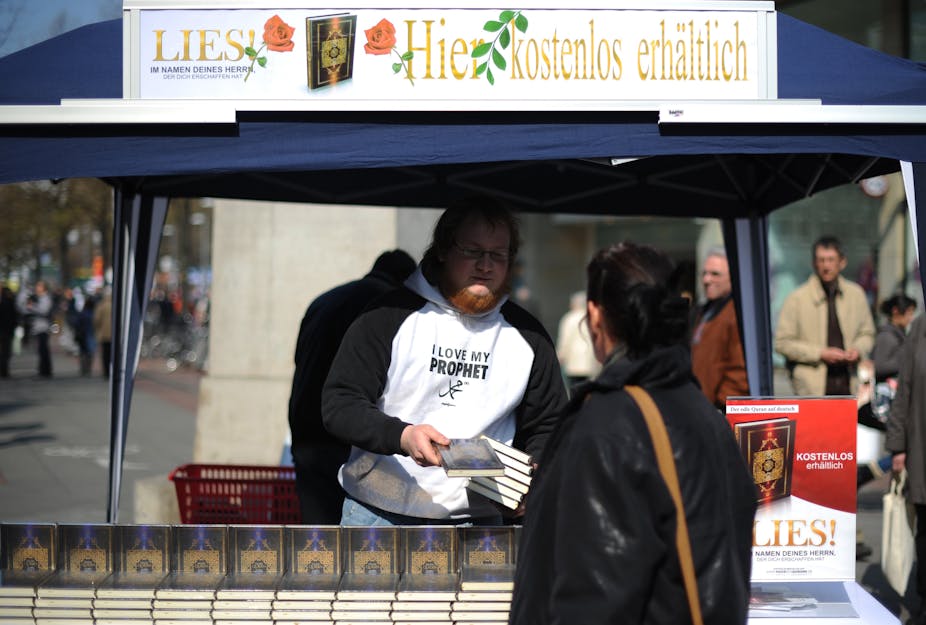Governments in Europe have been horrified to see their young nationals turning to extremist groups and committing terrible acts in their name, but few have stopped to think about how their own policies have contributed to the problem.
For decades, European countries have made it difficult for young people to be pious Muslims and feel European at the same time. But that hasn’t stopped them, it has simply taught them that their new-found faith may not be compatible with their European life. That in turn makes them all the more vulnerable to people recruiting for extremist groups.
Islam is now a significant part of the young, racially-mixed urban culture that exists all over Europe and, to some extent, North America. Thousands of Europeans convert to Islam and many ethnic Muslims who did not grow up in religious homes find Islam through friends.
Making new friends
Converted or born-again newcomers to Islam who find religion on their own often don’t fully understand that there are many different interpretations of Islam. They try to learn about the faith either on the internet or through neighbourhood mosques.
Many of them often end up in puritan Salafi mosques, which promote the idea of leaving all Western traditions behind and strictly emulating the life of Prophet Muhammad. Salafism is at heart a particularly conservative branch of Sunni Islam.
Salafis in Europe reach out to young people and converts more than other branches of Islam. Most Sunni mosques in Western Europe often have ties to countries such as Turkey or Morocco, where national mosque communities are less welcoming of converts, which makes them less approachable to Europeans. Mosques in the west that depend on financial support and other resources from these countries tend to function in the language of the immigrant community and are not welcoming to third or fourth-generation Muslims who do not speak these languages.
Salafi mosques operate quite differently in European cities. They are among the few Islamic centres to use the local European language as their main mode of communication rather than Arabic and their communities tend to reflect the national and racial diversity of their surrounding neighbourhoods. Most Salafi communities across Europe are not jihadist, and even stay away from political engagement. Most converts or born-again Muslims, especially those with a criminal, find their lives are significantly improved by joining Salafi communities. They finish school, get married, establish businesses, and start a new life.
The problem can be that the isolationist nature of Salafi communities also provides a context for jihadists to recruit young and impressionable new Muslims. Because Salafi communities prize leading a lifestyle cut off from non-Muslims and other branches of Islam, newcomers to religion often turn their back on their families and friends and are more easily impressed by the new people they meet, even when they promote radical ideas.
European Muslim converts are an excellent opportunity for jihadists, as they come with valuable resources such as money, mobility, linguistic ability and access to technology.
No direction
For decades, many European governments have made life difficult for European Muslims. They have treated individuals or groups that promoted Islam among, say, French or German nationals, with suspicion. They have instead supported mosques that centre around one or another distinct national group. Rather than making it possible for people to receive Islamic education in their local context and local language, governments have enabled Imams who do not speak the local language and know nothing of local culture or issues to carry on as they were, rather than adapting.
These policies have ensured that most mosques do not speak to the realities of young people in their areas. Despite their isolation from other branches of Islam and Western culture, Salafi mosques have stood apart in this respect. They reject the Western way of life but are keen to recruit more people away from it at the same time. They are streets ahead of national mosques in tuning into European culture and life and are an appealing option as a result.
Changing times
European conversion to Islam is part and parcel of the immigration process. As Muslims become more European, more Europeans will become Muslims and children of non-religious Muslim immigrants will become more involved in Islam independently of their families.
The solution to the integration of Muslims is also an answer to radicalisation. European governments should trust and support individuals and organisations who promote being both Europeans and pious Muslims. They should encourage Islamic education in the local language and stop treating converts as threats to the nation.
Being European and a pious Muslim should not feel like a devious act that can be practised only away from mainstream society. That will only reinforce the equation of being a European Muslim with being radical. It will make it easier for jihadists to appeal to young Muslim converts and born-again Muslims.

